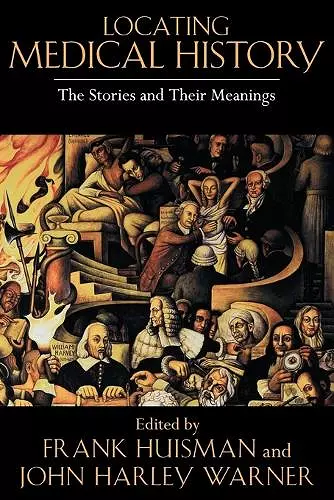Locating Medical History
The Stories and Their Meanings
John Harley Warner editor Frank Huisman editor
Format:Paperback
Publisher:Johns Hopkins University Press
Published:17th Nov '06
Currently unavailable, and unfortunately no date known when it will be back

In recent years, there has been a dramatic shift in how historians of medicine approach their subject. To assess the current state of the discipline, Frank Huisman and John Harley Warner have brought together many of the most eminent historians of medicine to address a tremendous variety of topics within the field as it is practiced today. The resulting volume is an important and stimulating work that will be read both within the field and beyond it. -- Harold Cook, Director, The Wellcome Trust Centre for the History of Medicine
Reverby. Wellesley College; David Rosner, Columbia University; Thomas Rutten, University of Newcastle upon Tyne; Heinz-Peter Schmiedebach, University of Greifswald; Christiane Sinding, Institut National de la Sante et de la Recherche MedicaleThe issues constituting the history of medicine are consequential: how societies organize health care, how individuals or states relate to sickness, how we understand our own identity and agency as sufferers or healers. In Locating Medical History: The Stories and Their Meanings, Frank Huisman, John Harley Warner, and other eminent historians explore and reflect on a field that accommodates a remarkable diversity of practitioners and approaches. At a time when medical history is facing profound choices about its future, these scholars explore the discipline in the distant and recent past in order to rethink its missions and methods today. They discuss such issues as the periodic estrangement of medical history from medicine, the influence of Foucault on the writing of medical history, and the shifts from social to cultural history and back again. Chapters explore the early history of the field, its transformations since the 1970s, and its prospects for the future. With diverse constituencies, a multiplicity of approaches, styles, and aims is both expected and desired. This volume locates medical history within itself and within larger historiographic trends, to provide a springboard for discussions about what the history of medicine should be, and what aims it should serve. Contributors: Olga Amsterdamska, University of Amsterdam; Warwick Anderson, University of Wisconsin, Madison; Allan M. Brandt, Harvard Medical School; Theodore M. Brown, University of Rochester; Roger Cooter, University College London; Martin Dinges, Institut fur Geschichte der Medizin der Robert Bosch Stiftung; Alice Domurat Dreger, Michigan State University; Jacalyn Duffin, Queen's University; Elizabeth Fee, National Library of Medicine; Mary E. Fissell, The Johns Hopkins University; Danielle Gourevitch, Ecole Pratique des Hautes Etudes; Anja Hiddinga, University of Amsterdam; Ludmilla Jordanova, University of East Anglia; Alfons Labisch, Heinrich-Heine-University; Hans-Uwe Lammel, University of Rostock; Sherwin B. Nuland, Yale University; Vivian Nutton, University College London; Roy Porter, formerly University College London; Susan M. Reverby. Wellesley College; David Rosner, Columbia University; Thomas Rutten, University of Newcastle upon Tyne; Heinz-Peter Schmiedebach, University of Greifswald; Christiane Sinding, Institut National de la Sante et de la Recherche Medicale
Locating Medical History more than succeeds as, in the editors' words, 'an invitation to explore and reflect on a field-one that can include widely disparate senses of what medical history is, should be, and should do.' The volume contains several specialized and deeply theoretical essays intended for the medical historian, but any physician or researcher interested in the current status of the history of medicine will also enjoy and learn from it. -- Xavier Bosch Science 2005 The volume is exceptionally well edited and introduced and beautifully produced. -- Bill Luckin Medical History 2006 After this collection, there will no longer be any excuse for medical historians to pretend that their historical background is merely the 'doctors' histories' supposed once to have ruled the earth. This collection highlights much more interesting ancestries, making links with great traditions of scholarship since the Enlightenment, and with political traditions of both left and right. It includes many personal accounts and assessments which suggest how our disciplinary work can be related to wider goals within and beyond the academy. All historians of medicine should own a copy. Social History of Medicine 2005 A must read for every historian of nursing and student of nursing history. The essays capture the diversity and dynamism of healthcare in a coherent, engaging manner. Nursing History Review 2006 The volume has been excellently written and edited, while it is offering a wealth of references. Reading it I experienced as exciting, stimulating my imagination, challenging to approval or peevishness, inviting to rereading it in the near future. It is a very 'rich' volume, and most certainly a book that one ought to buy or to be given as a present. It is more than worth its price. Nederlands tijdschrift voor geneeskunde [A] virtue of the book, and the reason everyone should buy it, is that it attempts to be international and makes visible the work of several scholars who are not known or read by many English-speaking historians. Bulletin of the History of Medicine 2006 A thoughtful and stimulating volume. -- Philip M. Teigen Isis 2006 Contain[s] a number of interesting essays by some of the most creative medical historians of our time. Journal of the History of Medicine and Allied Sciences 2006
ISBN: 9780801885488
Dimensions: 235mm x 156mm x 34mm
Weight: 726g
520 pages